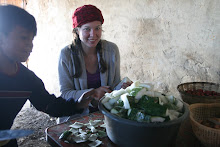Today I gave a difficult charla on a very delicate subject—la violencia intrafamiliar, or domestic violence. I was speaking to the local midwives. What I was hoping to do more than anything was to just start a conversation about a problem that thrives in secrecy. As trusted community leaders and health workers in the most remote and underserved areas, these women have a great opportunity to provide counsel to women in distress.
First I told them a story of a fictional couple named Laura and Luis. Laura began to suffer from Luis’ beatings, threats and intimidation when she became pregnant. Things got worse and worse until she realized he was a threat not only to her, but to their children as well. She finally decided to make a plan. I asked them what a woman in her situation could do.
“Nothing,” they all said. “She just has to suffer through it.” There’s an old saying in Guatemala “Si te casas, te aguantas” “If you marry, you put up with it.” They didn’t like the idea of calling the police or going to the justice of the peace, because of what an irate husband could do.
One midwife shared a terrifying story. She had a patient who she knew was being abused by her husband, and sadly, the baby was stillborn. She wanted to go to the justice of the peace about it. But then the husband began to threaten her, “No matter where you go, no matter what path you take, I’ll find you—and then I’ll kill you,” he told her. So, the midwife kept her mouth shut about that and decided not to ask so many questions next time.
I encouraged them to look for skills they have already, like cooking, sewing or making handicrafts to earn money outside of the husband, but they were skeptical. Even as I suggested different approaches, my solutions sounded a little lame.
The midwives even refused to be convinced that violence is never the fault of the victim! This is perhaps the most important point I wanted to impart.
Basically, it made me realize how entrenched this problem is here. These women were almost scared to talk about domestic violence in a closed-door room with a group of their friends. The funny thing is, despite their dismal outlook for women of their generation currently in abusive relationships, they all knew the solution. Education. The problems that came up during the charla were always that an illiterate woman with no education and no job training is trapped. The good news is, the next generation is changing. More girls are enrolled in schools than the past generation, and thanks to welfare programs like Mi Familia Progresa, enrollment is way up.
